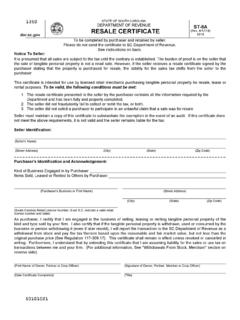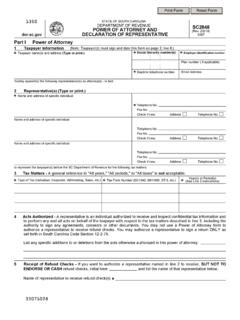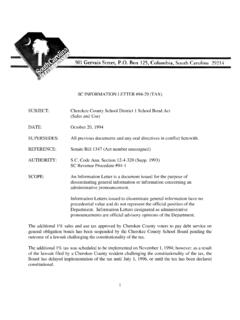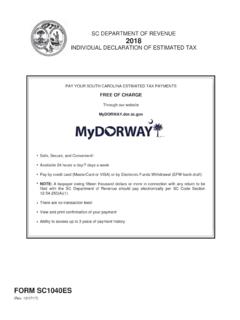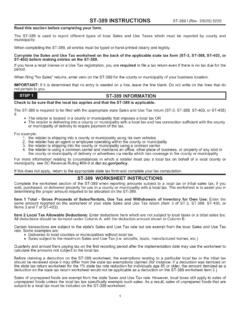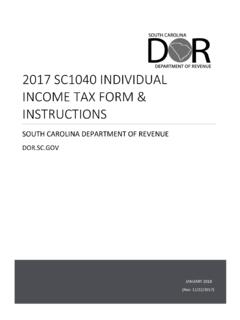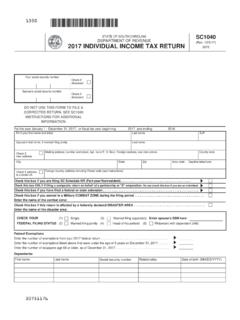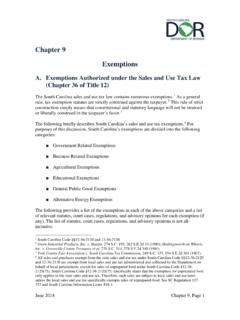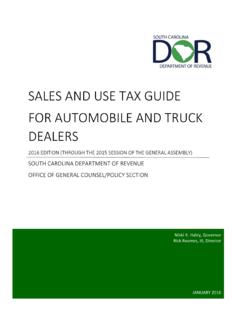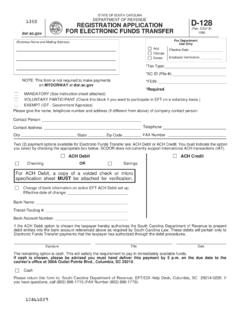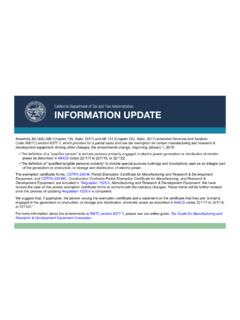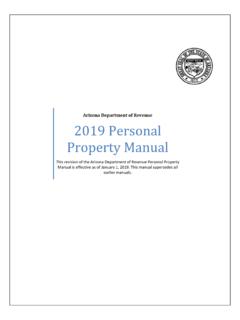Transcription of Moving to SC - South Carolina
1 12/19 Moving to SC A TAX GUIDE FOR NEW RESIDENTS South Carolina DEPARTMENT OF REVENUE 1 If you are considering Moving to South Carolina or have been a resident for only a short period of time, you may have questions about South Carolina s tax structure. This publication contains information for South Carolina s main state and local taxes. For more details, visit or call 1-844-898-8542. INDIVIDUAL INCOME TAX South Carolina has a simplified Income Tax structure which follows the federal Income Tax laws. South Carolina accepts the adjustments, exemptions, and deductions allowed on your federal tax return with few modifications.
2 Your federal taxable income is the starting point in determining your state Income Tax liability. TAX RATES Individual Income Tax rates range from 0% to a top rate of 7% on taxable income. Tax brackets are adjusted annually for inflation. DEDUCTIONS You do not pay taxes in this state on property sold in another state. A deduction of 44% is allowed on net long-term capital gains. The South Carolina holding period for long-term gains is the same as the federal. You may deduct a portion of your qualified retirement income included in South Carolina taxable income. See the SC1040 Instructions for more information .
3 At age 65, all residents are eligible for a deduction from any source of income. See the SC1040 Instructions for more information . If you have military retirement income included in your South Carolina taxable income, you may make a deduction up to the amount of military retirement income. See the SC1040 Instructions for more information . Reserve pay income received from the National Guard or armed forces for annual training and weekend drills is exempt from tax. Disability income from a total and permanent disability is deductible. South Carolina does not tax Social Security benefits or railroad retirement.
4 Interest from federal obligations is deductible. You are allowed a deduction for each dependent claimed on your federal Income Tax return who had not reached the age of six by December 31 of the tax year. You are allowed a South Carolina dependent exemption for each eligible dependent claimed on your federal Income Tax return. A deduction is allowed for a special needs adopted child. CREDITS A refundable tuition credit for tuition paid to South Carolina colleges may be available for those who qualify. Beginning with the 2018 tax year, the credit is 50% of tuition paid, 2 not to exceed $1,500 per tax year, for 2-year and 4-year institutions.
5 Beginning with tax year 2018, full year or part-year resident taxpayers may claim a refundable credit for the lesser of the increase in South Carolina Motor Fuel User Fee they paid or the preventative maintenance costs they incurred in South Carolina during the tax year. A two-wage earner credit allows married couples to take a if both spouses work. For tax year 2019, the credit cannot exceed $257. A maximum credit of $300 is available for payments of in-home nursing care. A credit is allowed for taxes paid to another state on income taxable in both states. A child and dependent care credit allows an individual to claim 7% of federal allowable expenses.
6 Beginning with tax year 2018, full-year residents may claim the non-refundable South Carolina Earned Income Tax Credit if they were allowed the Federal Earned Income Tax Credit on their federal return. See the SC1040TC for more information on available tax credits. ADDITIONS TO INCOME Certain items of income must be added back to your federal taxable income. If any out of state losses were subtracted on your federal Income Tax, they must be added back to your taxable income on your state return. The deduction on your federal return for state Income Tax paid may need to be added back to your taxable income on your state return.
7 PART-YEAR RESIDENT If you moved to South Carolina during the year, you are considered a part-year resident. As a part-year resident, you may file as a full-year resident or a non-resident. If you file as a part-year resident, you will claim all of your income as though you were a resident for the entire year and take credit for any taxes paid in another state. As a non-resident, you will report only income earned in South Carolina . Your deductions and exemptions will be prorated by the same percentage as your South Carolina income compared to your total income. You may choose the method which benefits you best.
8 FILING YOUR RETURN Generally speaking, you are required to file a South Carolina Income Tax return if you are required to file a federal return, or if you are a non-resident with South Carolina gross income of more than the federal personal exemption amounts. You can file your South Carolina tax return in one of several ways: Electronic filing using a professional tax preparer or available commercial software 3 SCDOR website using available vendors Paper return Individual Income Tax returns are due April 15 of each year. However, if you file and pay your South Carolina return electronically, you have until May 1 of each year to file and pay without incurring a penalty.
9 This deadline does not apply to federal Income Tax returns or to taxpayers filing paper returns. ESTIMATED TAX Estimated Tax is the method used to pay tax on income that is not subject to withholding. Examples include income from self-employment, interest, rent, dividends, alimony, capital gains, and prizes. You may also have to pay Estimated Tax if there was not enough tax withheld from your salary or other income. Estimated Tax is paid in quarterly installments on April 15, June 15, September 15, and January 15. ESTATE TAX South Carolina does not impose an estate tax or a gift tax.
10 property TAXES Counties, cities, and school districts are authorized to impose ad valorem taxes on real and personal property . Local governments assess and collect most property taxes which support public schools and services. RESIDENTIAL property The market value of an owner-occupied legal residence is assessed at 4% of fair market value. This market value is determined as a result of a periodic countywide reassessment. The millage rate of the local government is then applied to the assessed value resulting in the tax liability. The millage rate is set by local governments and varies throughout the state.
